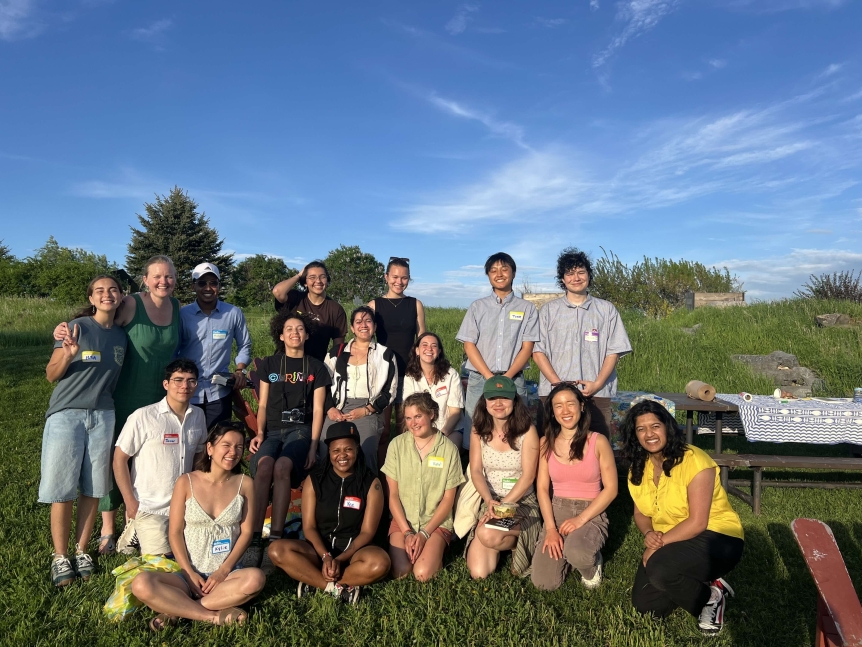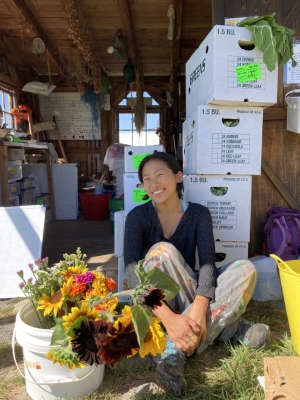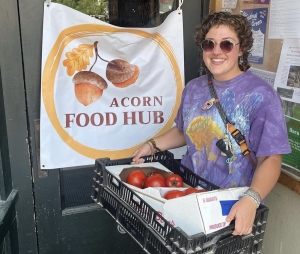Climate Action Fellowship

With its launch in the Fall of 2020, the year-long, paid Climate Action Fellowship program offers students from various backgrounds and disciplines the opportunity to deeply engage in collaborative thinking and skill development on how to confront the climate crisis in meaningful ways.
Apply for the 2026-2027 cohort at go/caf2026/
Application dates and deadlines for the 2026-2027 cohort
2/23: Applications open
3/9: Info session #1: Monday 3/9
- 12:40 in Hillcrest 103
3/31: Info session #2: Tuesday 3/31
- 4:30 in Hillcrest 200
4/3: Applications close
4/9-4/17: Interviews
4/20: Offer positions
About the Fellowship and Application
Fellows work together (and with partners and mentors) to identify their own roles and theories of change in the world of climate action, while supporting the engaged learning pillar of Energy2028. They coordinate with groups on campus and in the community through a mix of defined projects and projects of their own design to envision pathways for all students to leave Middlebury with the knowledge, motivation, and capacity to act on climate change in just and equitable ways.
Each cohort spends the summer working with a relevant organization or tackling an independent project, coming together weekly with other fellows sprawled across the globe to compare notes and build community together. They begin their work thinking about the following:
- How do you think change happens?
- What does a better world look like to you?
- How can Middlebury ensure that all students leave equipped to tackle climate change?
- How might your work as a Fellow support that? What perspectives and backgrounds might you bring to the table?
- What kind of work do you hope to do after graduation?
- What other questions would you want to explore as a group/individual?
- How does my climate work intersect with justice work?
In returning to campus in the fall, their projects focus on a variety of themes including but not limited to:
- Working with departments, centers, and student groups on climate change integration
- Planning and implementing communications efforts
- Coordinating speakers, trainings, and other events
- Working with data to better understand needs, opportunities, and impacts
- Connecting with alumni on career pathways and toolkits
- Connecting beyond Middlebury with other schools, local and national organizations, community groups, etc.
Application Process
Students applying should come to this application with a secured summer internship or project and a supervisor. The Fellowship can provide funding for summer experiences, so you may apply with an unpaid OR paid internship or project. For unfunded experiences, we will provide up to $4000 in supplemental funding. All Fellows will receive an additional $750 for participating in coordinated efforts (weekly meetings, guest speakers, reflections, etc). All Fellows continue into the school year to work on projects of their choosing and will be compensated for their work at Middlebury on an hourly basis.
The expectation is that Climate Action Fellows commit to a full year on campus for the Fellowship. However, we understand that educational priorities change, and studying abroad is an exciting opportunity. We love supporting a limited number of Fellows who study abroad or have shifts in their academic timing, and we have asked applicants to share this information with us in the application.
We are committed to working with students from all backgrounds and requirements to make the Fellowship experience a positive one, and will accommodate as many needs as possible as students move through the application, offer, and participation processes. Please be in communication with the CAP team so that we can support you in the application process!
Interested in the Fellowship or just want to get involved? Reach out to Minna Brown at mbbrown@middlebury or Reilly Isler at risler@middlebury.edu with any questions.
Frequently Asked Questions
How long is the fellowship?
The Climate Action Fellowship is a full year commitment. Fellows begin in the summer and are expected to continue throughout the academic year. There is opportunity to re-apply for the fellowship for a second year.
How does payment and funding work?
You should think of the Fellowship as something you layer on top of your internship or project work, so you may apply with an unpaid OR paid internship or project.
For unfunded experiences, we will provide up to $4000 in supplemental funding.
All Fellows - those with funded and unfunded experiences - will receive an additional $750 for participating in coordinated Fellowship efforts (weekly meetings, guest speakers, reflections, etc).
All Fellows continue into the school year to work on projects of their choosing, and will be compensated for their work at Middlebury on an hourly basis OR through an award. Applicants are encouraged to have ideas about their academic year work, but are not required to have an exact plan when applying.
What is the time commitment of the Fellowship during the summer and academic year?
During the summer, all Fellows are expected to attend a one-hour-long weekly meeting via Zoom throughout our summer session. Additionally, there are three reflection assignments throughout the summer, which will also take some amount of time to write.
During the academic year, we also expect that Fellows will attend one-hour-long weekly meetings in person. There is also an end-of-semester reflection which will take some time to write. This is a time commitment in addition to whatever climate action independent projects, internships, and jobs you are pursuing as a part of your Fellowship. All Fellows continue into the academic year to work on projects of their choosing and will be compensated for their work at Middlebury on an hourly basis (or through an award if needed). Students can continue building and working on projects they began over the summer, or can take on a completely different project of their choosing.
Of course, a key aspect of our Fellowship is flexibility and adaptability. For example: We have had fellows in the past who were in a completely different time zone in the past, thus couldn’t join our summer meetings. That’s okay! Just let us know and we’ll find ways to adapt to your needs, and can find creative alternatives to make sure you are still participating and contributing to the Fellowship with everyone else!
As a fellow, what are deliverables and/or final products expected of me throughout my fellowship term?
As a Climate Action Fellow, some reflections on your work, projects, and experience must be completed throughout the fellowship duration. Typically, there are three reflection documents you will submit throughout the summer, in addition to one reflection at the end of each semester. We do not want to be too prescriptive, however! If you have other mediums by which you would like to share your reflections (a podcast, artwork, zine, poetry, video, instgram, etc.) we are open to exploring that with you. At the end of the day, these reflections are meant to be generative, and can be tailored to your learning needs.
We are in the process of developing a blog where all reflections and any additional content can potentially live!
As you take on projects, other “deliverables” can be developed if they support your experience! Many students have created zines, videos/recordings, hosted events, or written in public-facing media outlets as a part of their fellowship experience. These are all possibilities, and the whole point of the fellowship is to grant you the space and agency to explore.
Can I apply with a self-directed project?
Yes! You can apply to the Climate Action Fellowship with a self-directed project. It does not need to be an official internship, job, or organized position with an established organization or entity. We encourage you to use this funding to create-your-own project/internship/etc. However, whatever independent project you do apply with to the Fellowship must have a solid structure, clear goals and learning objectives, and demonstrated commitment to maintaining yourself accountable to outcomes. All independent projects must have a guide, mentor, or supervisor who is holding you accountable to the project you’re doing over the summer and throughout the year.
We encourage you to reach out to Climate Action Program staff with any questions if you intend to apply with an independent project and have any questions.
I think my thesis and/or class work overlaps with my fellowship project idea or summer internship. Does that disqualify me from applying?
Not at all! We see the Climate Action Fellowship as an additive experience to whatever projects you may already be working on, or hope to pursue during your fellowship term. We see the fellowship as an opportunity to complement space to expand upon the requirements of your academic work.
For example: A past Climate Action Fellow was writing a thesis on Black farmers in Vermont. As a part of their work, the Fellow grew a strong bond with the farmers and decided to invite a handful of them to campus to speak to other students and share a meal. They were able to access funds and resources through the fellowship to provide an honorarium to the farmers and supply food funding for all guests. Their thesis work was a throughline through this event, but the farmer dinners themselves were an additive opportunity given the funding and capacity afforded to them by the Climate Action Fellowship!
We cannot “double dip,” meaning you cannot get both credit and payment. If there is an overlap, please include how your fellowship project and academic project overlap yet diverge in!
Am I still qualified to apply even if I only have one semester left as a student at Middlebury?
Yes! It’s nice to have students who will be here for a whole year, but we have had one-semester fellows in the past and highly encourage you to apply.
If you are a graduating Feb applying to be a Climate Action Fellow, we encourage you to elaborate as to why being in the fellowship for one semester would work for the development of your project and why it is important for propelling your work forward.
I'm not sure if my fellowship project is sufficiently focused on climate...
We’ve had Fellows doing research on seed systems, organizing for farmworker organizations, putting on LGBTQIA+ Pride events, teaching at Zen Buddhist retreats, doing research for consulting firms, creating poetry and art zines, and so much more! We believe that you can look at every issue with a climate and justice lens, and encourage you to apply to our Fellowship and make that lens explicit in the projects you take on.
What does intersectional climate action look like to the Climate Action Program?
The climate crisis not only requires collaboration across disciplines, but an understanding of the compounding effects that climate change has on all of the other social ills confronting our world. Climate touches everything, and we believe that unity, collaboration, and coordinated action which breaks our silos are critical. We believe that we cannot address the climate crisis without also addressing racism, ableism, patriarchy, colonialism, imperialism, war, violence, poverty, and other social ills. The environmental and climate movements have historically been exclusionary, neglecting to incorporate the voices and frameworks of our neighbors with marginalized identities. The Climate Action Program and Fellowship is a space where we want to encourage this sort of boundary-crossing intersectional work. We aspire for this space to be a place where we push each other to approach climate work with a justice, equity, and expansive lens. It is imperfect work, as intersectional climate work is understood but hard to implement in centuries-old institutions like Middlebury College, but we’re giving it our best shot! Join us in this effort!
Past Fellow Projects

Written, researched, and composed by Crystal Zhou (‘23.5), Black Vermont Farming is born out of an appreciation and curiosity for the ways Black people in the diaspora approach food sovereignty, afroindigenous regenerative agriculture, and community oriented earth work. With various frameworks in mind, Black Vermont Farming examines the legacy of Black environmentalists, the history of Black land ownership in the United States, and the local Black farmers that continue to do the work here in Vermont. During winter term, Crystal had the opportunity to host a J-Term Workshop titled “Black Vermont Farming” with Middlebury College students, and invited folks from SUSU CommUNITY Farm, Khelcom Farm, Calabash Garden, and Flying Buffalo to cook and eat with community. This zine is a report of Crystal’s frameworks, a collection of their findings, and a directory made by their students that details the 18 Black owned farms found in Vermont.

After a year abroad studying food system transformations across the globe, Marlow Saucier (‘24) brings into the world “musings.” Saucier writes, “This is a collection of poems written during my time studying Food Systems abroad, or that I wrote as a part of my final nonfiction work in Spring Ulmer’s Creative Writing class. They are a response to the beautiful and horrific challenges and changes I have seen and undergone within the last 6 months. These poems are my joy, pain, frustration, and grief, my amazement at seeing people doing the work in various places around the world. This collection is a celebration, and this collection is also a eulogy, for who I was, for a past that we will never be able to return to, and in some ways, for the future I thought I would have.” This work of art explores a few central questions: What does it mean to make art in this time of climate crisis? How do we change our relationships to confront the climate crisis? What is the role of the artist in weaving ideas of relationally and climate action?
Molly Babbin (‘23) put together a zine titled “together, at the end” to explore how we find our place in movements for change in the midst of an apocalyptic reality. With support from the Climate Action Program, Babbin researched how we build community and address conflict/harm in social movement organizations. Babbin writes, “I realized after years of organizing with other young people, there was so much we had learned about working together that would be important to document before leaving Middlebury. However, I most of all felt like I was surrounded by brilliant people who have a lot of wisdom about these themes, so I interviewed some staff/faculty/students/friends. The zine is a compilation of everything they shared with me, plus info from books (and a lot of adrienne maree brown). It’s aimed at other students trying come together for climate/social justice while trying to care for each other and themselves at the same time.”

